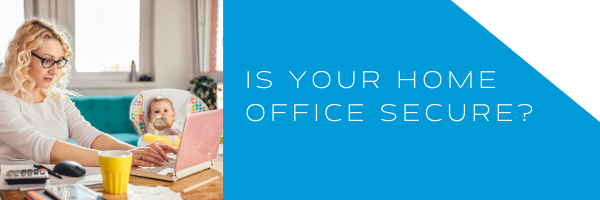
Still, working from home? Yep us too! it’s the ‘ new normal’ right? Whether we’re working from the dining room table or we’ve managed to get a sweet home office setup, it’s not just about the ergonomic chair and widescreen monitor. Working from home brings a whole host of security issues that you just wouldn’t consider in the office…
In this blog, we explore how employees can make sure their home set up is secure and take a look at some of the risks and how to overcome them:
Don’t leave your Wi-Fi unsecured
If you’re working from home, then you’re almost certainly using your private home network to do so – and that’s fine but it does raise the risk of leaked data and even those in the same household seeing sensitive company data. As a very basic step, you should always be using a password to join your Wi-Fi network.
Using a personal device? Hit that update button!
If you haven’t got a ‘work’ laptop or you prefer to use your own tech, then there are obvious risks associated with that. You’re unlikely to have the same security settings on a personal device which means you could be putting company data at risk – but this sort of risk can be easily overcome. Firstly you can liaise with your employer to get the right security in the place (making sure it isn’t against policy in the first place!) and you can do your bit by ensuring your personal device has all the relevant updates installed as not doing so leaves you incredibly vulnerable to cyberattacks. Those updates are there for a reason so get them done!
For passwords, think strong and change them often
Think about all the places you log into – if you even log in? do you have all those passwords stored? are they all the same? Don’t worry you’re not alone, but it’s time for change. Passwords must be strong and unique which means you’ll end up with lots of them, we recommend using a password manager to store these – which of course will also be password protected so that’s the biggie you need to remember.
We don’t want to talk about viruses but…
We are referring to the computer kind and they can be avoided by investing in anti-virus software, particularly if you are using a personal device. Your organisation may provide a recommended one if you’re using their device but otherwise, you will usually find that your Internet Service Provider offers one and it’s generally free to use too.
Keep the kids off your work devices
We’re not suggesting your kids are mad hackers or anything but your work device is exactly that ‘ for work’ so it’s good practice to not let anyone other than yourself use them. After all, you wouldn’t let your kids run amok in the office and start playing Minecraft on your desktop so the same applies at home.
Store things – where you’re told to…
This means using approved storage solutions and programmes. So no ‘ just saving’ to your desktop and no using different versions of programmes – if you do you’re both increasing the security risk and giving the person or people who look after your I.T a massive headache. Solutions like Office 365 and One Drive are perfect for this but regardless of the actual product, it is the use of a centralised company approved storage solution which is the key here.
And finally, stick to company policy
It’s natural to opt for the easiest way, most humans do and so when you are working remotely it’s tough for your employer to enforce policies, but here’s the key thing they are ‘policies’ rather than guidelines or suggestions, they likely form part of your contract of employment and the consequences of not following them can be severe, so do your bit follow the rules and keep yourself and your company safe.
Need help with your remote teams and security? We’re here! Get in touch for an informal chat today!
